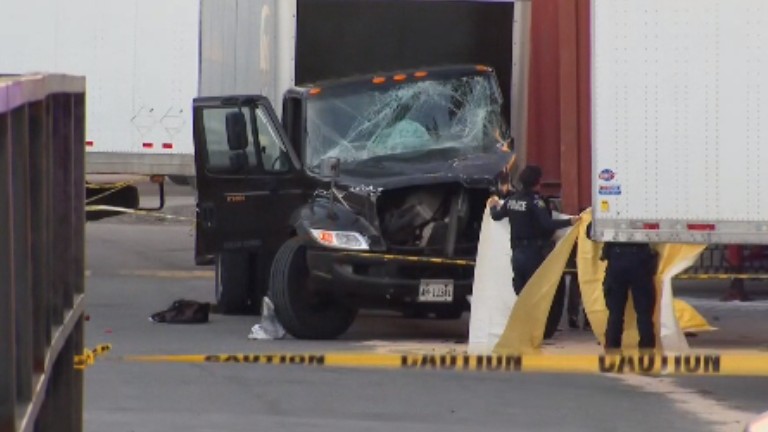Woman uses app to collect donations for Ukrainian refugees
Posted May 25, 2022 4:18 pm.
Last Updated May 25, 2022 5:53 pm.
An app aimed at connecting neighbours led one woman from Vaughan to collect critical items for refugees in her community.
The free app called NextDoor connects people with their neighbours. It launched in Canada back in 2020 at a time when many people were isolated due to the COVID-19 pandemic.
It’s something that CEO Sarah Friar believed was needed after conducting a survey in the GTA that showed that more than a third of GTA residents don’t know their neighbours’ names.
Their data showed that knowing as few as six of your neighbours can reduce the likelihood of someone feeling lonely which can be linked to depression and social anxiety.
Currently, Nextdoor is in 11 countries and provides it’s users with updates and assistance during emergencies through partnerships with the Red Cross, and also provides a space to give away items and communitcate with neighbours.
“In moments of disaster, beyond the pandemic, things like the storms that just ripped through [Ontario], that’s an exact moment when you want organizations to be active on the platform giving people guidance.”
It has provided many with a sense of community that has been tough during the pandemic, including Alexandra Pokras. She downloaded the app about a year ago when she first moved to a new community.
“We live in a time where it’s not so easy to go out there and meet your neighbors. And I actually moved into my neighborhood during the pandemic as well. So, I wouldn’t say that it was super easy to meet members,” Pokras told CityNews.
Pokras said she really felt the power of NextDoor when she started a project called HelpShare.org that welcomes refugees into communities by the posting of free items, both from locals and organizations
“I decided to go next door and post about it and let my neighbors know that this website exists. I just had an amazing response from my neighbors,” said Pokras, who acknowledged the incredible support she recieved.
“They wanted to help and a lot of neighbors actually ended up posting their items on the website. So we’ve reached a point where we have over 200 posts with hundreds of free items available for refugees to take and pick up or or to be delivered to them.”
“For me, this was just like a testament to the power of community and the fact that refugees are really just new neighbors that are that are coming to our communities, to our neighborhoods,” shared Pokras. “And what an amazing way it is to welcome them by saying, “We are here for you and we’re here to uplift you and support you’.”
When Ukrainian refugees began arriving, Pokras said the community stepped up again. She said one of her neighbours is filling up purses with necessities and self-care items then delivering them in person while another has put together backpacks filled with school essentials and toys for children.
“It’s incredible to see the grassroots types of regular everyday people just doing amazing things to help support,” said Pokras. “I think that it would have been more challenging for me to reach people that really do care about their neighborhood about their community. So I think it’s just provided a great platform for me to speak to people that are interested in getting involved and supporting others.”
Friar said she is not surprised by this outpouring of support, adding since the beginning of the pandemic, NextDoor has seen an almost 17x increase in neighbours offering and asking for help in Canada.
“Of course it doesn’t always have to be extreme. Sometimes getting help can be something like ‘I lost my keys on my run’, or ‘does anyone know a good plumber?’,” said Friar. “NextDoor has really thrived as people have created neighborhood groups again, and have found ways to reconnect after being kind of squirreled away in their homes for multiple years now.”
In a time of online bullying and misinformation, Friar said it also prides itself on being a safe space for users.
“This is a place where I think NextDoor is truly leading edge. It all starts with that fact that you’re a real person at a real address. We take the time to verify you as you join. So you don’t have kind of fake avatars or people who don’t want to give their real name. And so that levels up an element of accountability because the likelihood that you stand next to that person that you just were having a conversation with on next door in the local coffee shop is actually quite high.”
There are currently more than 240,000 moderators currently working to ensure harassment and misinformation are not being spread on the app.
Frair add the app has partnered with local businesses and politicians.
“We think hyperlocal, trusted and the ability to help people come together online to offline is a huge part of what makes NextDoor special.”










